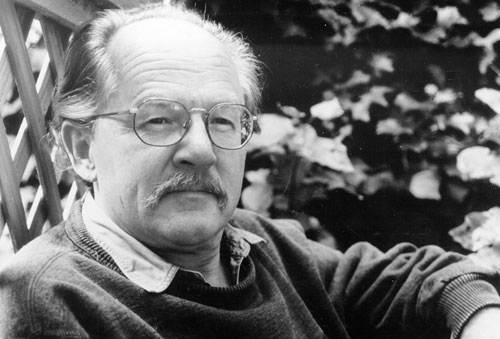
Patrick Lane (nacido el 26 de marzo 1939 en Nelson, British Columbia, CANADÁ) es un reconocido poeta canadiense. Ha escrito en varios otros géneros, incluyendo ensayos, cuentos, y autor de la novela Perro Rojo, Red Dog.
Bibliografía
Letters from the Savage Mind - 1966
Separations - 1969
"Calgary City Jail" - 1969
"On the Street" - 1970
Mountain Oysters - 1971
The Sun Has Begun to Eat the Mountain - 1972
"Passing Into Storm" - 1973
Beware the Months of Fire - 1974
"certs" - 1974
Unborn Things: South American Poems" - 1975
"Albino Pheasants" - 1977
Poems, New and Selected - 1978 (winner of the 1978 Governor General's Award)
No Longer Two People - 1979 (with Lorna Crozier)
The Measure - 1980
Old Mother - 1982
Woman in the Dust - 1983
A Linen Crow, A Caftan Magpie - 1984
Selected Poems - 1987
Milford and Me - 1989
Winter - 1989 (nominated for a Governor General's Award)
Mortal Remains - 1991 (nominated for a Governor General's Award)
How Do You Spell Beautiful? And Other Stories - 1992
"Praise" - 1993
Too Spare, Too Fierce - 1995 (winner of the Dorothy Livesay Poetry Prize)
Selected Poems - 1997
The Bare Plum of Winter Rain - 2000 (nominated for the Dorothy Livesay Poetry Prize)
There is a Season - 2004 (nominated for the Hubert Evans Non-Fiction Prize)
published in the US as What the Stones Remember: A Life Rediscovered 2004 (nominated for Barnes & Noble Discover Great New Writers Award for Non-fiction)
Go Leaving Strange - 2005 - (nominated for the Dorothy Livesay Poetry Prize)
Red Dog, Red Dog - 2008
Editado con Lorna Crozier
Breathing Fire - 1995
Addicted: Notes from the Belly of the Beast - 2001
Breathing Fire 2 - 2004
EL PÁJARO
El pájaro que atrapaste está muerto.
Te dije que se moriría
mas no quisiste aprender
de lo que te contaba. Querías
enjaular un pájaro en tus manos
y aprender a volar.
Escucha otra vez.
No debes manosear pájaros.
Ellos no pueden volar a través de tus dedos.
No eres un nido
y una pluma no
está hecha de sangre y hueso.
Sólo las palabras
pueden volar para ti como pájaros
sobre la pared del sol.
Un pájaro es un poema
que habla del fin de las jaulas.
TREINTA BAJO CERO
Los hombres sobre la charca
empujan troncos a través del hielo constante.
Los rostros echan barbas de escarcha.
Nadie se mueve más allá del ritual
del trabajo. Tormento de metal
y el chillido de las sierras.
Todo es duro. El cielo
araña la tierra a treinta bajo cero
y las cosas vivas jalan hasta el dolor
como niños grotescos
arrojados en la estación equivocada.
Alguien maldice.
Arranca su mano de la cadena.
Su piel se ha quedado sobre el acero,
la sangre congelada en bolas.
Es sustituido y el trabajo continúa.
Todo es duro.
El frío alancea la lenta danza
sobre la charca. El hombre nuevo tiembla
fuera de sí.
No puede sostener su barra.
Alguien se ríe,
dice que se romperá el hielo
antes de que cierren este maldito aserradero.
Traducción de Bernd Dietz.
These poems appeared on Salamander Poems in May 2012. Take a look. They do a nice job.
Bonsai
Far off in the cedars the jay screams his morning song.
I hear the words in the twisted trunk of the yew.
The woman before me told the tree to suffer for her sake.
The old can’t be made young again. The tree can’t be undone.
The wind weaves ribbons through my fingers. Stillness waits.
The winter fish eat the dawn slowly, their bodies consume.
Water has its own way. There is a new silence at the end of a poem.
The jay laughs as he torments the robin. Never mind, I say.
Poets, Talking
I could wish poems happened more, but wanting them
only leads to the impediment of desire and desire
is never equal to the act. It’s much the same as looking back,
expecting a story and finding the characters already dead.
The surprise of that. How the past gets worn down by idle use.
These days the poem comes much as the first bat does
in the false dawn. Its flight the mental stumble that I love.
I have my hungers even as they elude me.
Things are so simple, a bat, and the consequent moth
I create to keep my world whole a little longer.
The poems come to me now as then, occasions, the good ones rarely.
The moth, its wings so white they startle me, escapes.
For the moment. I watch the delicate violence of the dance,
the bat, and the moth too, veering.
Dinner
I would like to have dinner with the man
who didn’t follow Christ, the one who,
when Jesus said: Follow me and I
will make you fishers of men, decided
to go fishing instead, getting in his boat,
pushing out from shore, his nets clean
and repaired, thinking I will have to work
even harder now in order to feed
everyone left behind. I would like
to sit on the beach with him
in front of a careful fire,
his wife and children asleep,
sharing a glass of wine, both of us
telling stories about what we’d done
with our lives, the ones we caught,
the ones that got away.